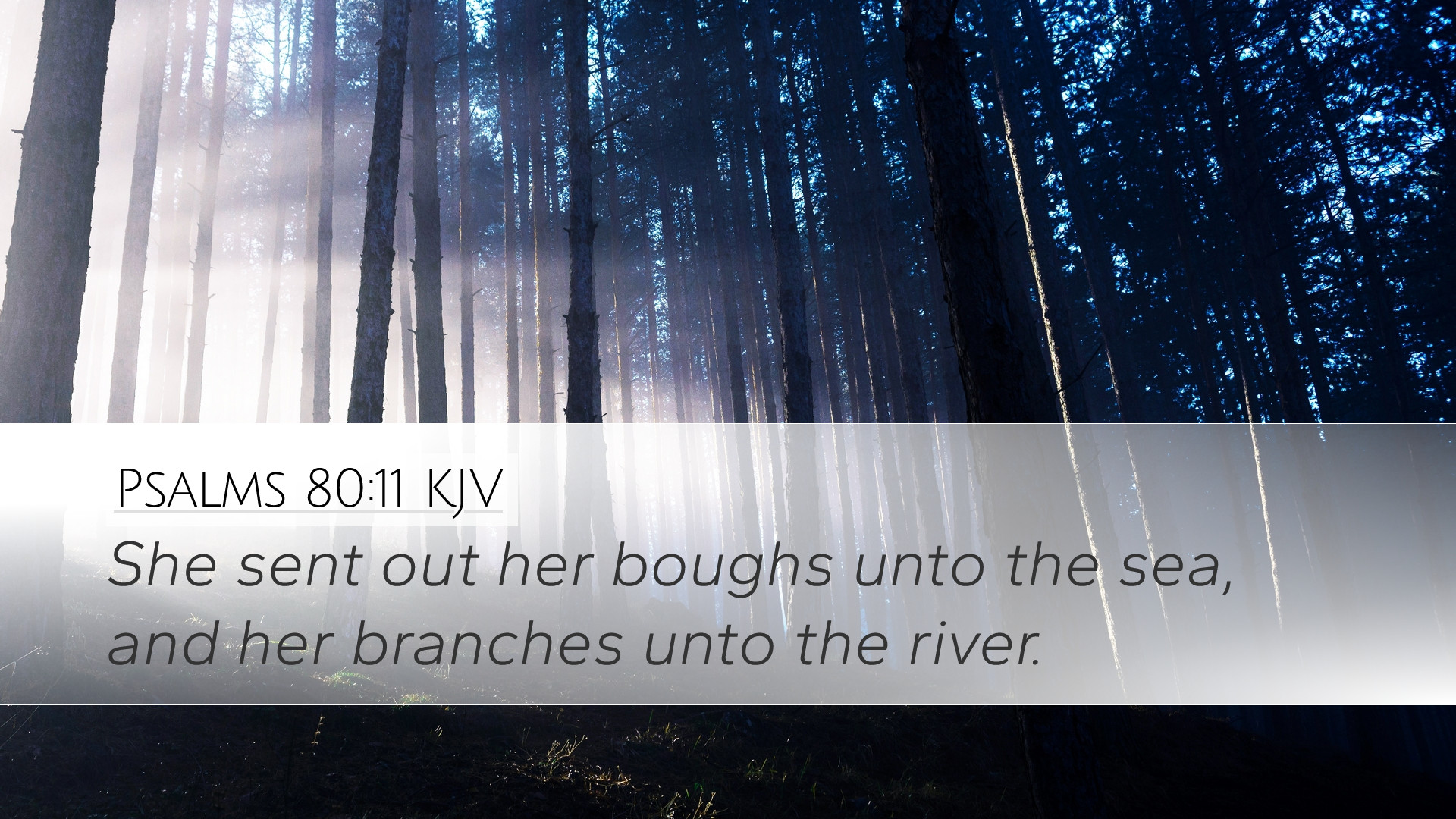Commentary on Psalms 80:11
Text of Psalms 80:11 (KJV): "She sent out her boughs unto the sea, and her branches unto the river."
Introduction
This verse from Psalm 80 reflects a vivid and powerful image of Israel as a vine, illustrating the nation’s growth, expansion, and the divine favor that once surrounded it. The imagery employed in this verse serves not only as a historical reference but also speaks profoundly to theological concepts regarding the relationship between God and His people.
Thematic Overview
As we approach this verse, various themes emerge:
- The Symbol of the Vine: Israel is symbolically represented as a vine, a common metaphor throughout Scripture signifying growth, fertility, and divine care.
- Divine Favor and Judgment: This passage can be interpreted as reflecting God's past blessings and the current state of His displeasure due to Israel’s unfaithfulness.
- Expansion and Influence: The imagery of extending branches illustrates both the physical and spiritual influence of Israel under God’s providence.
Exegesis and Commentary
Historical Context
Historically, this psalm is attributed to Asaph and is structured as a communal lament, pleading for restoration and the return of God’s favor. The metaphor of the vine indicates how God had planted Israel in a fertile land, intending for her to thrive and bear fruit. Reflecting on the past, the psalmist recalls the once-glorious state of the nation, now overshadowed by distress and the need for divine intervention.
Verse Analysis
"She sent out her boughs unto the sea"
This phrase signifies the extensive reach of Israel’s influence. Traditionally, the sea can symbolize the nations and the broader world. The boughs reaching unto the sea imply a divine intention that Israel would not be confined geographically but would extend its impact far and wide, suggesting a mission to the Gentiles and the promise of blessing to all nations through Israel.
"and her branches unto the river"
The river symbolizes fresh waters, nourishment, and life-giving sustenance. The reference to branches extending to the river reinforces the idea of growth and blessing. This imagery suggests that Israel, under God’s provision, would not only be prosperous but also a source of sustenance to those around her, echoing the blessings found in divine favor.
Theological Implications
The implications of this imagery extend beyond its literary beauty; rather, they serve as an important commentary on the character of God. The fact that Israel had once flourished under God's hand indicates His sovereign will to bless His people. However, the decline represented in the verses that surround this imagery signifies a direct consequence of turning away from God, serving as a reminder to contemporary believers of the dangers of disobedience.
Comparative Insights
Matthew Henry emphasizes the nature of God as the caretaker of His people. He notes that when Israel was situated in the promised land, she was a vine planted by God which flourished abundantly. Henry draws attention to the fact that the exclamation of the psalmist should evoke a longing for restoration, calling upon God to return and rejuvenate what has been lost.
Albert Barnes further elucidates this imagery by emphasizing the inextricable link between Israel's physical growth and its spiritual state. Barnes mentions that the reaching out of the boughs signifies both a blessing and a responsibility. Israel’s failure to maintain their covenant with God directly influenced their standing and witness to other nations, a vital aspect of their identity as God’s chosen people.
Adam Clarke interprets the "sea" and "river" as indicative of the various realms of human experience—spiritual, cultural, and geographical. He asserts that the branches reaching out symbolize a desire for the knowledge of God to permeate all aspects of life, confirming the notion that Israel was designed to be a hub of divine revelation to the world.
Practical Applications
For pastors, students, and scholars alike, the study of Psalms 80:11 speaks to several pertinent applications:
- Growth in Faith: Just as the vine was meant to grow, believers are called to increase in their faith, influence, and witness in the world.
- Restoration and Renewal: A constant reminder that we are to seek God's restoration in times of spiritual drought and desolation, reflecting on how turning back to God can revive our spiritual lives.
- The Call to Missional Living: Like Israel, the Church today is called to extend its reach toward the nations, embodying the Great Commission as a means of fulfilling God’s plan for humanity.
Conclusion
Psalms 80:11 serves as a profound reminder of God’s intention for His people to thrive and spread His influence throughout the world. The rich imagery of the vine and its branches draws upon the historical context of Israel and its covenant relationship with God, illuminating both an ancient truth and its continued relevance today. As we reflect on this text, may we be inspired to pursue growth, embrace restoration, and extend our branches to the nations, sharing the life-giving message of the Gospel.


